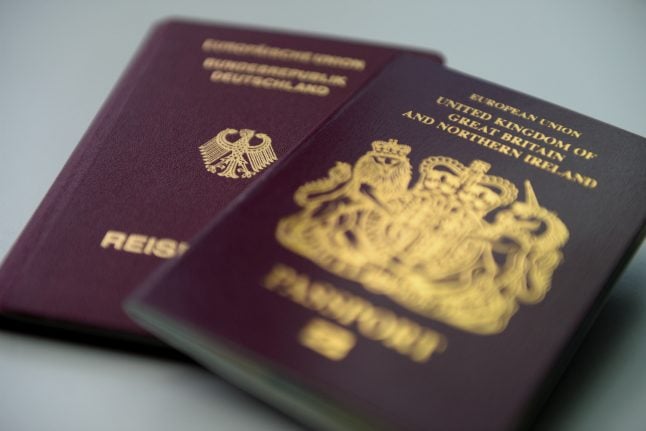Two of British opera singer Simon Wallfisch's great-grandparents were shot in mass graves by the Nazis and another died in a concentration camp.
So it was with pangs of guilt and triumphant defiance that Wallfisch took on German citizenship once his country decided to leave the European Union after 46 years.
“I've had to use a major family tragedy to shore up some security for my future and my family's future,” Wallfisch, who is also a cellist, told AFP while taking a break from a protest performance of the European anthem outside the British parliament as MPs prepare for a historic vote on Brexit later on Tuesday.
“Of course there are mixed emotions,” the 36-year-old father of two said.
Rising tide
About 70,000 Jews fled Nazi-occupied Europe to Britain in the harrowing years preceding World War II.
A rising tide of their children and grandchildren are now overcoming misgivings and using a clause of the German constitution to restore the citizenship stripped from them by the Third Reich.
Official Berlin figures show only 43 Britons applying for German passports in 2015 under the special exception for victims of the Holocaust and their descendants.
That number jumped to 684 when Britain voted to leave the European Union in 2016. It grew again to 1,667 last year and reached 1,229 in the first nine months of 2018 as more and more people sought ways to preserve their EU right to work and travel freely across the bloc's 27 states.
Their decisions reflect the success of Germany's tortuous coming-to-terms with its history – and the anguish many Britons feel at their island nation's isolationist turn.
“On the one hand, I feel like I'm sort of a traitor to my great-grandparents,” Wallfisch said after a moment's reflection.
“On the other, I feel there's a triumph here. Me becoming German and remaining a European citizen, which I always believed I was, is a victory over the nationalists, the Nazis.”
SEE ALSO: How Brexit and the fight for rights united Britons across Europe
Identity crisis
Britain's planned March 29th departure from the European project was decided in a bitterly fought referendum that gave voice to the disaffected and those feeling abandoned by the ruling elite.
It also fed into social schisms that saw the number of anti-Semitic incidents and other hate crimes recorded by the police in England and Wales rise from 52,465 in 2014-15 to 80,393 in 2016-17.
Yet some taking the plunge and adopting a dual German nationality come from non-religious families that slowly shed their Jewish identities as they assimilated in the mostly Christian kingdom.
Senior Guardian newspaper reporter Amelia Hill said she was brought up in a secular household and decided to reclaim her German roots while watching “dumbstruck” as the referendum results rolled in on TV.
“I really enjoyed saying to people: I am making my family German,” she recalled.
“But when they accepted me and I had to go to pick it up with my children and my husband, I delayed that process, that last step for a long time because I suddenly thought: this isn't me, who actually am I, this just must be something I've done that is nuts.”
This identity crisis made Hill realise that she was a European Londoner at heart.
“Why would I want my children to not be able to live lives as Europeans?” she asked. “I refuse to let my identity and my children's identity be utterly changed by a minority” of the total population who voted to leave.
Overcoming history
Some British Jews have had a harder time looking past history.
House of Lords peer Julia Neuberger – a Jewish community leader who is also a London synagogue rabbi — wrote in The Times that her mother “would neither visit Germany nor buy German things” after coming to England in 1937.
Yet Neuberger felt comfortable enough to herself try to reclaim her heritage when Brexit was voted through. She was denied on a technicality.
Popular former TV crime show presenter Nick Ross said he also got his passport “for the sake of saying something to Germany” in recognition of its struggle to overcome the past.
His decision pre-dated the referendum and he refused to blame fellow Britons too harshly for choosing a course with which he so profoundly disagreed.
Ross saw it as a natural product of the 2008-2009 global recession that eventually swept populists to power in Europe and Donald Trump to the presidency of the United States.
“There was a rebellion against all these people who were all so smug, who still seemed to be doing very well for themselves,” said Ross.
But he said he did not expect ever to leave London because “I am actually fiercely patriotically British”.
“This is still by anyone's standards a very liberal society,” said Ross. “And as long as it remains that, I am going to do all I can to support that.”
By Dmitry Zaks



 Please whitelist us to continue reading.
Please whitelist us to continue reading.
False argument. The rise in anti-semitism in the UK has nothing to do with the UK leaving the EU. The Labour Party – rife with anti-semitism – and the rise in the number of muslims are the reasons. Look at the French example.